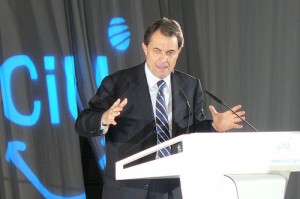
A turbulent year in Catalonia is coming to an end with what is likely to be a major upheaval in the region’s political balance of power, caused by the November 28 regional election.
The issue of regional sovereignty and the related questions of autonomy and even independence have been in the air more than usual throughout 2010. An unbinding referendum on independence in 211 Catalan towns (which gave an overwhelming “yes” response but saw an extremely low turnout) in April set the tone. Then in June, the Constitutional Court, after four years of deliberation and institutional foot-dragging, struck down several clauses in the new Estatut, which granted extra powers to the region. The response was a wave of renewed nationalist fervour, culminating in a massive march through the streets of Barcelona on July 10 to protest Madrid’s meddling.
These developments have undoubtedly influenced the Catalan election’s outcome. The moderate, conservative nationalists of CiU are poised to overthrow the governing leftist coalition by posting an overwhelming victory, increasing their seats in the regional parliament from 48 to somewhere near the full majority of 68.
Such a win would confirm the rise of CiU’s candidate for regional premier, Artur Mas. Having lost the 2003 and 2006 elections, the self-assured Mas has cast off the albatross that was his predecessor as party leader, the wily Jordi Pujol, to emerge as a major political figure in his own right and reengage with the Catalan electorate. His only worry is that the anticipated low turnout will undermine his mandate, or that he will be forced into some unseemly horse-trading by failing to win more than 60 or so seats.
The Catalan Socialists (PSC), with 37 seats and led by José Montilla, have undoubtedly been hurt by the tensions with Madrid. The Córdoba-born Montilla has had to navigate an unforgiving course between loyalty to the PSOE Spanish Socialists and proving that the PSC is “Catalan” enough. But other factors have also played their part, most obviously the economic crisis, which Catalonia has suffered like the rest of the country. Any association with the government in Madrid in that area is utterly toxic and as a former minister under Zapatero, the uncharismatic Montilla was particularly exposed.
The PSC’s difficult relationship with its tripartite partners, the ERC radical nationalists and the ICV-EUiA greens, has also been a hindrance, reflected by the fact that none of those parties has appeared willing to countenance a repeat of the coalition.
ERC’s predicament is a particularly curious one. Despite the fact that the issue of Catalan separatism has drifted towards mainstream political debate, this pro-independence party is likely to be one of the election’s losers, with a drop in its 21 seats certain. This is explained by its own dysfunctional behaviour, including some very public internal feuds, as well as its role in an unpopular government.
National overtones for the PP
One of the biggest mysteries is how the Popular Party will fare. With its insistence that Catalonia does not need to increase its autonomy, it makes itself an easy target for nationalists of all stripes, but also has a unique electoral niche. With 14 seats, the PP is a relatively minor force in the region, but its performance will have national overtones that could offer clues about the outcome of the 2012 general election.
In the 2008 Spanish election, the PP’s loss was attributed in great part to its weak showing in Catalonia, a key region on the electoral map. Any improvement on its current representation in the local parliament could be read as a sign it is in a position to sweep to victory in 2012. If it does perform well, it will be more a triumph for the party than its candidate, Alicia Sánchez-Camacho, who is one of the least valued politicians in Catalonia, according to pollster Metroscopia. However, her campaign style, which has often been overtly xenophobic in its handling of immigration, could become a blueprint for the PP in 2012 if it is deemed a success.
Zapatero, meanwhile, is unlikely to draw much inspiration from Montilla’s performance and he will have to look ahead to regional elections across the rest of Spain in the spring for any signs of a possible Socialist resurgence.
Visca Catalunya lliure!